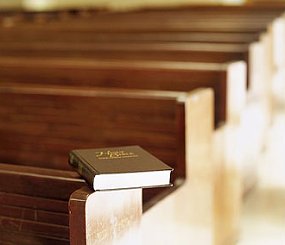Someone had let a whirlwind into the room.
Elder George Merriweather gazed at his Rolex. They’d been at this for only 10 minutes, but it felt like 10 hours. He glanced at Deaconess Lisbeth Cartwright and sighed. The former Miss America candidate from Connecticut nodded, and her blonde curls went bouncing.
Westminster Wesleyan had endured plenty of storms in the church’s nearly 200-year history, but it had scarcely seen the likes of this present hurricane, all 300-pounds in fluorescent eyeshadow of her, Miss T’juana Dupree Jones.
“It ain’t right to call Zion no ’xperiment,” the woman responded. “Alls I sayin’ is that Miss Thelma could use that food too. And Miss Laetitia and Miss Lucinda.”
Pastor W. Thornton Hill III regretted his choice of words. In a way, Zion Holiness Temple was an experiment. Changing demographics in the neighborhood abutting Westminster Wesleyan, while not exactly forcing the church’s hand, made it essential that the church consider an outreach that would bring the Gospel to more of the people who lived in the nearby area. Church leaders also recognized that Zion might need to have its own “flavor” if it was to develop its own style of ministry, one that Hill recognized he wasn’t equipped to understand. While Zion shared much with its parent church, Westminster encouraged the Zion congregation that met under its roof to develop its own programs.
Zion didn’t have a home meals delivery program like Westminster did. And at least one person did not like this disparity.
“Miss Thelma be 91 years old, livin’ alone in a one-room ’partment with no A/C,” Jones continued. “You been up to her place?”
Benevolence Committee leader Quentin Greenway shook his head.
“No, ” Jones said, barely hiding her ire, “I don’t think you been.”
Olivia Brentwell, co-leader of the committee, spoke up.
“You have to understand, Miss Jones, we’re trying to encourage the Zion congregation to—”
“And I’m trying to encourage y’all to recall that Miss Lucinda done got her man blowed up in that desert war and got three precious little babies she need to feed, and y’all got the money and food.”
Greenway leaned forward and attempted his own interjection. He failed miserably.
“And Miss Laetitia been a widow lady for 20 years. You remember her man? Worked hisself to death probably.”
Pastor Hill, who had been listening all the while he played with his Mont Blanc pen, grimaced at the mention. Laetitia Washington’s husband, Franklin, had been Westminster Wesleyan’s janitor for three decades before he passed away.
“Y’all could drive that little van a couple more blocks and drop off them ladies something decent to eat at least once a day,” Jones said. “I don’t see why not. It ain’t right the way it be now. That’s all I gots to say.”
Jones folded her hands into her prodigious lap and stared straight ahead, the laser focus of her eyes burning a hole in the far wall an inch to the right of Greenway’s bald head.
He spoke.
“We have solid, biblical reasons, Miss Jones, for denying the request.”
Jones’s brow knitted.
“We do not wish to enable neediness,” Greenway began. “People fall into a pattern of victimhood that is disempowering. They lose the ability to care for themselves as God intends, instead developing an unhealthy reliance on others.”
Cartwright called on her training and raised herself perfectly erect. “And suffering is good for the soul, Miss Jones. The Bible clearly states that in this world we will have suffering. We should look on it as a gift from the Lord and thank Him for it. Suffering builds character, strength, and perseverance, qualities that every Christian should possess.”
Brentwell smoothed her silk dress and added , “Miss Jones, if we were to give these three women what you ask, how many more should expect the same treatment? God shows no partiality, and neither should we.”
To which Greenway added, “And our own resources aren’t infinite. We have to be able to meet the needs of Westminster’s own.”
The brow-knitting on Jones’s face was beginning to develop its own Zip code.
As he always did, Elder Merriweather saw the moment as a teachable one.
“This is clearly an issue of God’s sovereignty,” he said through steepled fingers, eyes trained on Jones. “While I can commiserate with the plight of these women, they are in the state they are because of God’s will. He alone raises up, and He alone brings low. For us to stand as His judge and claim that we know better by meddling in God’s ways, I daresay our presumption will come back to bite us.”
The human storm stirred again. A hand rose from Jones’s lap, one finger emerging from five, straightening, filled with indignation.
“You with the enabling. You with the suffering. You with the partiality,” Jones said, her eyes flashing, “and you with that word I done never heard before. What all wrong with you? You pushin’ me to sin with what I’m thinkin’, but I’m just gonna say it: Y’all don’t got the common sense God done give a goose.”
Pastor Hill thought to reply when he saw the shock on his leadership team’s faces, but that was before he noticed something on Jones’s face: the track of a lone tear.
“I don’t got nothin’ in this world, not even the stuff in this one office, ” Jones said. “But I can see that I’m gonna have to take my nothin’ and make somethin’ of it so I can take care of three widow ladies who don’t get the food in one day y’all get from one of your brunches.”
At this, Jones lifted herself, collected her faux leopard-skin bag and left, making sure the door of the office slammed with just the right amount of force to make one final statement.
No one said anything.
Finally, Greenway spoke.
“For one, I look at this as a success. That woman left here empowered to take responsibility for the care of these women. By standing our ground, we empowered rather than enabled.”
Brentwell and Merriweather agreed.
“Ministry is hard,” Cartwright added, still a little frazzled by the encounter.
Pastor W. Thornton Hill III didn’t hear his leadership team’s self-congratulations, though. Instead, he could not take his eyes from the old, wooden cross that hung on the wall opposite his desk, just as it had for as long as he could remember.
***
Here is how another leadership team, long ago and far away, handled a similar situation in a much godlier way:
Now in these days when the disciples were increasing in number, a complaint by the Hellenists arose against the Hebrews because their widows were being neglected in the daily distribution. And the twelve summoned the full number of the disciples and said, “It is not right that we should give up preaching the word of God to serve tables. Therefore, brothers, pick out from among you seven men of good repute, full of the Spirit and of wisdom, whom we will appoint to this duty. But we will devote ourselves to prayer and to the ministry of the word.”
—Acts 6:1-4 ESV
God help us when we make up spiritual-sounding excuses supposedly based on “biblical theology” to ignore doing the right thing.

 Yesterday was a Sunday. I skipped church.
Yesterday was a Sunday. I skipped church. The lament we hear from many sectors in American Christendom is over the increasing number of people who shun church.
The lament we hear from many sectors in American Christendom is over the increasing number of people who shun church.